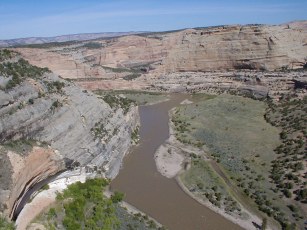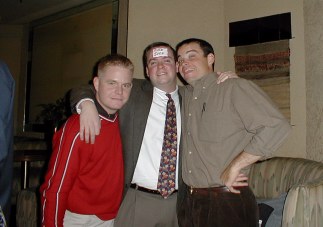Welcome to Pete's Web Site | home
Do not burn yourselves out. Be as I am. A reluctant enthusiast and part-time crusader. A half-hearted fanatic. Save the other half of yourselves for pleasure and adventure. It is not enough to fight for the west. It is even more important to enjoy it while you can, while it's still there. So get out there, hunt, fish, mess around with your friends, ramble out yonder and explore the forests, encounter the griz, climb a mountain, bag the peaks, run the rivers, breathe deep of that yet sweet and elusive air. Sit quietly for a while and contemplate the precious stillness of the lovely, mysterious, and awesome space. Enjoy yourselves. Keep your brain in your head and your head firmly attached to the body, the body active and alive. And I promise you this one sweet victory over our enemies, over those desk-bound people with their hearts in safe deposit boxes and their eyes hypnotized by their desk calculators. I promise you this: you will outlive the bastards.
Edward Abbey

Man is just a sentient being, among other forms of existence. The assumption that man is on top of the chain of beings is misplaced, considering the mysterious web of interdependent relationships that is now being confirmed through scientific studies. Reality is not hierarchical but a whole, circular, enclosed system. Sustainable development is, therefore, in the interest of every being, every day, not just in the interest of future generations.
Bhutan's representative to UN in keynote address

Sustainability should mean meeting the needs of the present without compromising the ability of future generations of all living things to meet their own needs. (It is) to enjoy life, liberty, and the pursuit of happiness free from intergenerational remote tyranny. It's not 'reduce, resuse, recycle.' It's 'redesign, reduce, reuse, recycle'.
William McDonough

Our relentless assault on the natural world may be fueled by as trivial a pursuit as shopping . Picture this typically mundane scene played out daily by tens of millions of people: an air-conditioned car cruising through a drive-in fast food outlet for a burger and fries in disposable packaging. This seemingly innocuous activity exemplifies the key components that are among the most environmentally destructive in our lifestyle. The energy, chemicals, metals, and paper expended in this act represent four of the five most energy-intensive and polluting industries. In a mere forty years, cars have burgeoned from 50 million to 500 million. In 20 years, the number is projected to double to 1 billion. Swing low, sweet chariot? For teenagers, time at the mall is on par with hours spent at home and in school. Just to supply newsprint to advertise those sales at the mall in US dailies, Canada cuts primeval forests every year on an area the size of the District of Columbia. Does any of this afford us more leisure time? Quite the opposite. Modern workers labor much longer hours now than people did before the Industrial Revolution, and vastly more than they did in hunting and gathering societies, which spent a mere three weeks a year taking care of basic food needs.
The scale of consumption we are induced to buy into is mainly motivated by corporate greed, not by human needs. Are we possessed by our possessions? Meanwhile the gap between rich and poor is arguably the greatest in human history. While most world spiritual traditions teach compassion for the poor, the afflicted, and the unfortunate, the meek are generally inheriting generational poverty and toxic waste zones. Is the fetishism of the commodity shredding the very fabric of human relations?
According to many traditions, the Earth was entrusted to humankind in a spirit of stewardship. Yet increasingly we are "playing God" by making fatal choices for countless other species and life forms. Evident in the precipitous loss of biological diversity - extinctions are expected to take one-fifth of Earth's species in just 20 years - our behavior raises spiritual questions about how humanity is serving.
What can you do? Diminish your consumption. Examine what you really need versus what you may think you want. Think about the impacts of your consumption: Is it worth it? And is consumption (once the name of a disease like gout) filling up your life and crowding out other experiences? Set your intention and allow space for nonmaterial pursuits in your life, whether it's a walk in the woods, meaningful time with friends, or prayer and reflection. Look at the issue of service in your life. What are you doing for others, whether homeless people or your next-door neighbors? How are you supporting the natural world, whether birds or rocks? Are there things you want to learn? Are there people who could be teachers to you? Above all, make space for these changes to happen in your life, and call them in. You might be amazed at how quickly the richness of life may unfold about you.
Kenny Ausubel in "Restoring the Earth"
